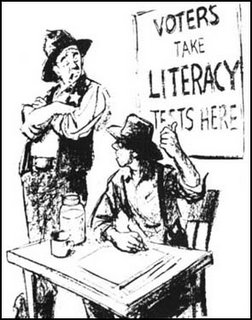 The Voting Rights Act is up for debate and renewal. When it was first passed, this law was badly needed to end abuses of voting registration laws that disenfranchised millions of Americans, particularly African-Americans in the southern states. Its (now) non-controversial provisions include bans on property requirements, literacy tests, and poll taxes as preconditions to voting. It is saddening to think that as recently as forty years ago, people were excluded from exercising their most crucial and fundamental right as citizens with this sort of nonsense.
The Voting Rights Act is up for debate and renewal. When it was first passed, this law was badly needed to end abuses of voting registration laws that disenfranchised millions of Americans, particularly African-Americans in the southern states. Its (now) non-controversial provisions include bans on property requirements, literacy tests, and poll taxes as preconditions to voting. It is saddening to think that as recently as forty years ago, people were excluded from exercising their most crucial and fundamental right as citizens with this sort of nonsense.The question is not whether the Voting Rights Act will be renewed, but how much of it will be. The debate reaches the issue of racial gerrymandering -- carving up Congressional districts to prevent or enable members of particular racial groups to be elected. Not much is likely to change; if anything, the law is likely to become more liberal than it currently is, so that Republicans are not hit with racial politics in the upcoming cycle.
One of the controversial sections of the law requires states to provide multilingual assistance to voting in districts and precincts where there are substantial numbers of non-English speakers. There is no doubt that English is the dominant language of America, and generally widespread agreement that this need not have been the case. The point, English-only advocates say, is not what our common langauge is but that we have a common language at all.
 Having travelled not too long ago to Barcelona, I can submit that society there is able to function despite the presence of more than one language in the area. The dominant language of Spain is, of course, Spanish. But in Barcelona, most people speak Catalan instead of Spanish as their primary language. That strange, lisping language was much more alien to me when The Wife and I were there than I thought it would be. "Eixample," an area of the city I much admired, is pronounced "EYES-am-pull" and the word translates roughly to "expansion." This is unlike Spanish ("extensión"), French ("expansion"), or Latin ("dilator"); Catalan is its own language. But there is no doubt that Barcelona, and the entire Catalan region, is very much part of Spain. While Barcelonans speak Catalan, they consider themselves Spaniards.
Having travelled not too long ago to Barcelona, I can submit that society there is able to function despite the presence of more than one language in the area. The dominant language of Spain is, of course, Spanish. But in Barcelona, most people speak Catalan instead of Spanish as their primary language. That strange, lisping language was much more alien to me when The Wife and I were there than I thought it would be. "Eixample," an area of the city I much admired, is pronounced "EYES-am-pull" and the word translates roughly to "expansion." This is unlike Spanish ("extensión"), French ("expansion"), or Latin ("dilator"); Catalan is its own language. But there is no doubt that Barcelona, and the entire Catalan region, is very much part of Spain. While Barcelonans speak Catalan, they consider themselves Spaniards.Canada has done just fine with two national languages, although the Francophones still seem to want to break away. Switzerland has four languages (German, French, Italian, and Romansch) and also does not lack for a national identity or cohesiveness. Few Swiss speak all three of the dominant languages of German, French, and Italian.
So I don't have any problems with non-English speakers being part of America and making accomodations to allow non-English speakers to participate in American society, and that includes voting.
 To a large degree, enabling non-English speakers to vote and review voting materials in their native language means assisting Latino voters. It's difficult to overestimate the power of the demographic shift going on around the country as our Latino population explodes. Twelve percent of American citizens, and about 30,000,000 residents of the United States, use Spanish, not English, as their first language. Stereotypically, these are working-class people who are not politically active. But that stereotype is not borne out in reality. Latinos, and Spanish speakers generally, are all over the board in terms of wealth, profession, and political behavior.
To a large degree, enabling non-English speakers to vote and review voting materials in their native language means assisting Latino voters. It's difficult to overestimate the power of the demographic shift going on around the country as our Latino population explodes. Twelve percent of American citizens, and about 30,000,000 residents of the United States, use Spanish, not English, as their first language. Stereotypically, these are working-class people who are not politically active. But that stereotype is not borne out in reality. Latinos, and Spanish speakers generally, are all over the board in terms of wealth, profession, and political behavior.While I'm not a fan of the President, I still consider myself a nominal Republican. And it really bothers me to learn that Republicans are going to resist this -- and I can't address the issue in an intellectually honest fashion without giving credit to George W. Bush for actually doing what other Republicans have only talked about -- reaching out to and successfully appealing to Latino voters. Whatever party fails to do this will labor under a significant handicap in the future.
Republicans will be fools to resist helping Latinos vote, just because for the time being, more of them vote Democrat than Republican. Latinos could be good Republican voters -- demographic data suggests that Latinos are upwardly-mobile economically, come from large families and tend to be religious, moreso than members of other racial groups. There are opportunities for Republicans here to make inroads into this growing constituency. The President has always been sensitive to this, and has demonstrated to his fellow Republicans that it is possible to appeal to Latino voters to a degree large enough to at least neutralize the group in the struggle for primacy in large-scale elections. Bush appeals to Latinos because he seems to value them. Too many Republicans dismiss Latinos as lost to the Democrats by circumstance of racial grandstanding and economic classification; and there is an undercurrent of fear and distrust of Latinos amongst a portion of the Republican party that resents the changes to society, including language, that Latino immigration represents. I won't go so far as to call it racism, but it comes close.
These are hard-working American citizens; the kind of people we want to attract as immigrants and that we want to maintain as workers and entrepreneurs. It's bad policy, and bad politics, to treat them as second-class citizens and not make them feel welcome here. And the importance of a single national language is overrated, as the experience of so many of our friends and allies around the world demonstrates. It's not so frightening to learn un poquito de español, is it?
So I say, renew the Voting Rights Act, as-is, and if you're smart (Democrats and Republicans) you'll use it to reach out to new voters. Sadly, I don't think there are a lot of politicians, particularly Republicans, who 1) are smart enough to do this, 2) want to do this, and 3) have the ability to do so with some degree of credibility. This is bothersome to me as I contemplate the upcoming move back to California; one of the things I dislike about California is that there is one-party rule there (Republican movie star governor nothwithstanding) and a big factor in that state of affairs is the fact that Latino voters are polarized against the Republicans, many of whom seem only too happy to return the sentiment. I don't know what Republican figure in California has the cajones to try and change that.

No comments:
Post a Comment
Thoughtful, insightful, or informative comments are always welcome. Advertising will be deleted permanently. TL reserves the right to delete comments in his sole discretion (but rarely does so other than for advertising).